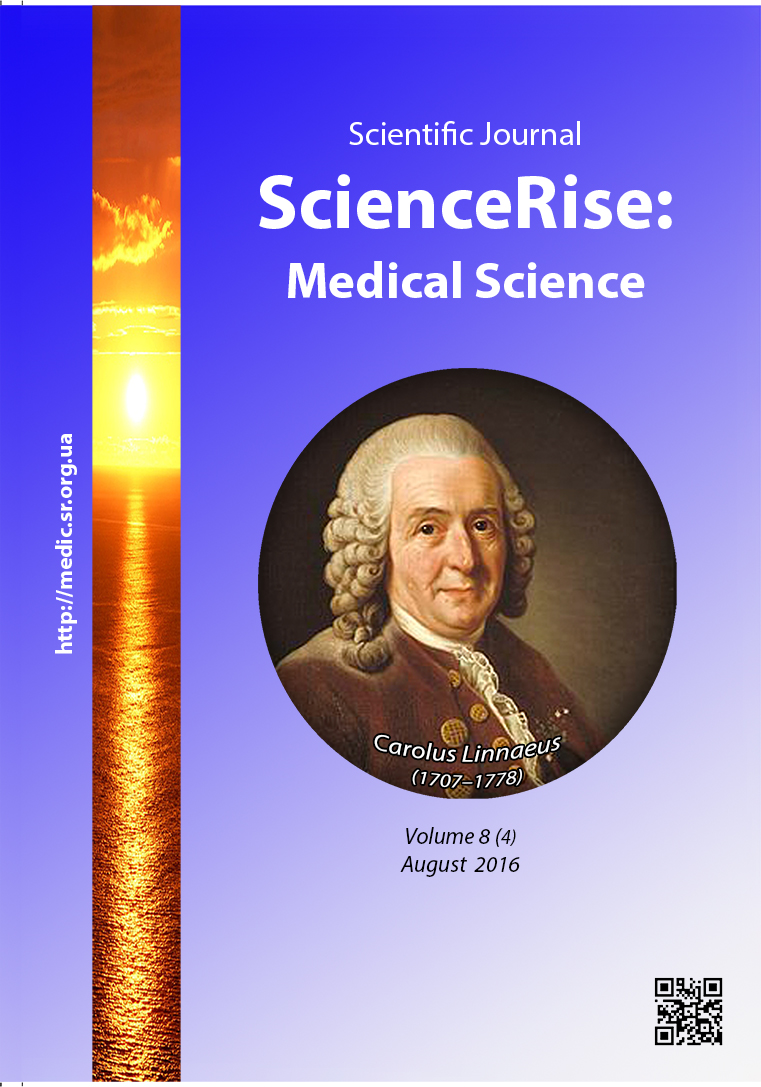Pharmacogenetic testing for CYP2C19 gene polymorphism for optimization of using antiplatelet therapy in patients with ischemic heart disease
DOI:
https://doi.org/10.15587/2519-4798.2016.76377Keywords:
polymorphism, clopidogrel, resistance, aggregation, myocardium infarction, plateletsAbstract
Clopidogrel is a one of most important antiplatelet preparations for patients with myocardium infarction (MI) but it has the different influence effects. The aim of this research was to assess the contribution of CYP2C19 gene polymorphism in inhibition of ADP-induced aggregation of platelets by clopidogrel.
Methods. We examined 52 patients (26,9 % women), mean age – 66,6±7,8 years with verified diagnosis MI. All patients underwent coronarography, stenting of infarction-depending coronary artery. All patients were divided in two groups: I carriers of *1/*1 allele and II – carriers of *2allele.
Results. *1/*1 polymorphism was determined in 82,5 % of patients. Gender analysis of spreading of CYP2C19 gene polymorphism indicates that among 14 examined women *1/*1 genotype was revealed in 78,6 % (n=11), *1/*2-*2/*2 genotype – in 21,4 % (n=3). Among 38 examined men *1/*1 genotype was revealed in 81,58 % (n=31), *1/*2-*2/*2 genotype - in 18,42 % (n=7). We did not find the essential differences in dependence of sex from CYP2C19 gene polymorphism. In the group I we revealed the more inhibited spontaneous aggregation (1,52±0,53 % against 7,7±2,24 %, р=0,0000672) and ADP-induced platelets aggregation (14,16±4,96 % against 21,78±7,77 %, р=0,0127). Any essential differences in aggregation, induced by arachidonic acid (AC) were not found between two groups (15,36±5,96 % against 16,22±3,23 %, р=0,57).
Conclusions. The spreading of CYP2C19 gene polymorphism is almost equal among men and women. According to the main mechanisms of clopidogrel effect, inhibition of ADP-aggregation of platelets proves that *1/*1-carriers of CYP2C19 gene react to the clopidogrel therapy better. CYP2C19 gene polymorphism does not influence on AC-induced platelets aggregation
References
- Chernyak, Yu. I., Kolesnikov, S. I., Chernyak, E. V. (2014). Cytochrome P450: basic understanding, research methods, the value for practical medicine. Irkutsk: Izdatelstvo of University, 48.
- Holmes, M. V., Perel, P., Shah, T., Hingorani, A. D., Casas, J. P. (2011). CYP2C19 Genotype, Clopidogrel Metabolism, Platelet Function, and Cardiovascular Events. JAMA, 306 (24), 2704. doi: 10.1001/jama.2011.1880
- Frére, C., Cuisset, T., Gaborit, B., Alessi, M.-C., Hulot, J.-S. (2009). The CYP2C19*17 allele is associated with better platelet response to clopidogrel in patients admitted for non-ST acute coronary syndrome. Journal of Thrombosis and Haemostasis, 7 (8), 1409–1411. doi: 10.1111/j.1538-7836.2009.03500.x
- Buryakina, T. A., Zateyshchikov, D. A. (2012). The use of reversible inhibitors of P2Y12 receptor in acute coronary syndrome. Kardiologiia, 52 (4), 74–79.
- Combescure, C., Mallouk, N., Berdague, P., Labruyere, C., Barazer, I. et. al. (2010). Clinical implications of clopidogrel nonresponse in cardiovascular patients: a systematic review and meta-analysis. Journal of Thrombosis and Haemostasis, 8 (5), 923–933. doi: 10.1111/j.1538-7836.2010.03809.x
- Brandt, J. T., Kirkwood, S., Mukopadhay, N. (2006). CYP2C19*2 polymorphism contributes to a diminished pharmacodynamic response to clopidogrel. J Am Coll Cardiol., 47, 380A.
- Bonello, L., Armero, S., Ait Mokhtar, O., Mancini, J., Aldebert, P., Saut, N. et. al. (2010). Clopidogrel Loading Dose Adjustment According to Platelet Reactivity Monitoring in Patients Carrying the 2C19*2Loss of Function Polymorphism. Journal of the American College of Cardiology, 56 (20), 1630–1636. doi: 10.1016/j.jacc.2010.07.004
- Angiolillo, D. (2004). High clopidogrel loading dose during coronary stenting: effects on drug response and interindividual variability. European Heart Journal, 25 (21), 1903–1910. doi: 10.1016/j.ehj.2004.07.036
- Collet, J.-P., Hulot, J.-S., Pena, A., Villard, E., Esteve, J.-B., Silvain, J. et. al. (2009). Cytochrome P450 2C19 polymorphism in young patients treated with clopidogrel after myocardial infarction: a cohort study. The Lancet, 373 (9660), 309–317. doi: 10.1016/s0140-6736(08)61845-0
- Pena, A., Collet, J.-P., Hulot, J.-S., Silvain, J., Barthelemy, O., Beygui, F. et. al. (2009). Can We Override Clopidogrel Resistance? Circulation, 119 (21), 2854–2857. doi: 10.1161/circulationaha.108.857722
- Sofi, F., Giusti, B., Marcucci, R., Gori, A. M., Abbate, R., Gensini, G. F. (2010). Cytochrome P450 2C19*2 polymorphism and cardiovascular recurrences in patients taking clopidogrel: a meta-analysis. The Pharmacogenomics Journal, 11 (3), 199–206. doi: 10.1038/tpj.2010.21
Downloads
Published
How to Cite
Issue
Section
License
Copyright (c) 2016 Олена Олександрівна Карпенко

This work is licensed under a Creative Commons Attribution 4.0 International License.
Our journal abides by the Creative Commons CC BY copyright rights and permissions for open access journals.
Authors, who are published in this journal, agree to the following conditions:
1. The authors reserve the right to authorship of the work and pass the first publication right of this work to the journal under the terms of a Creative Commons CC BY, which allows others to freely distribute the published research with the obligatory reference to the authors of the original work and the first publication of the work in this journal.
2. The authors have the right to conclude separate supplement agreements that relate to non-exclusive work distribution in the form in which it has been published by the journal (for example, to upload the work to the online storage of the journal or publish it as part of a monograph), provided that the reference to the first publication of the work in this journal is included.









